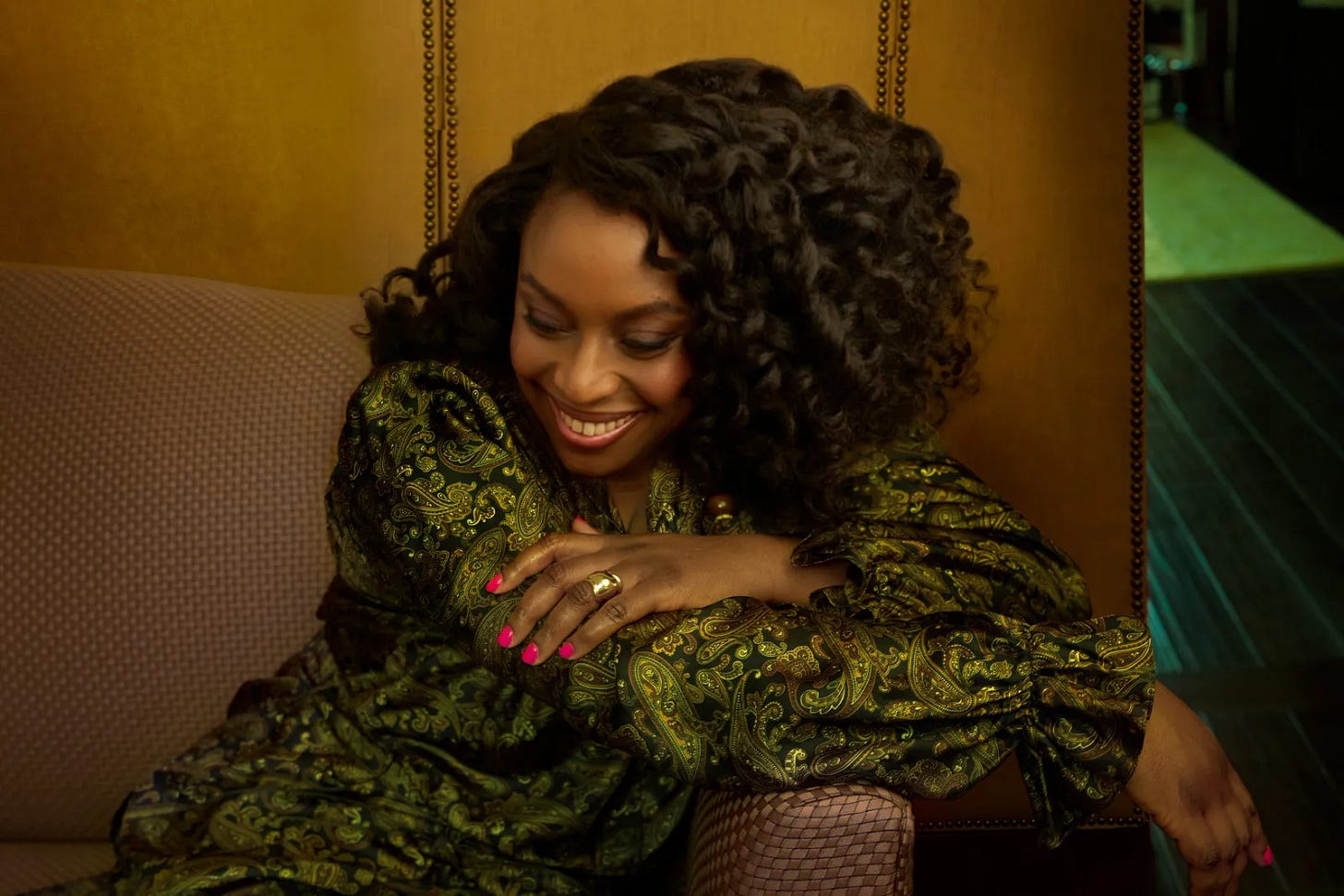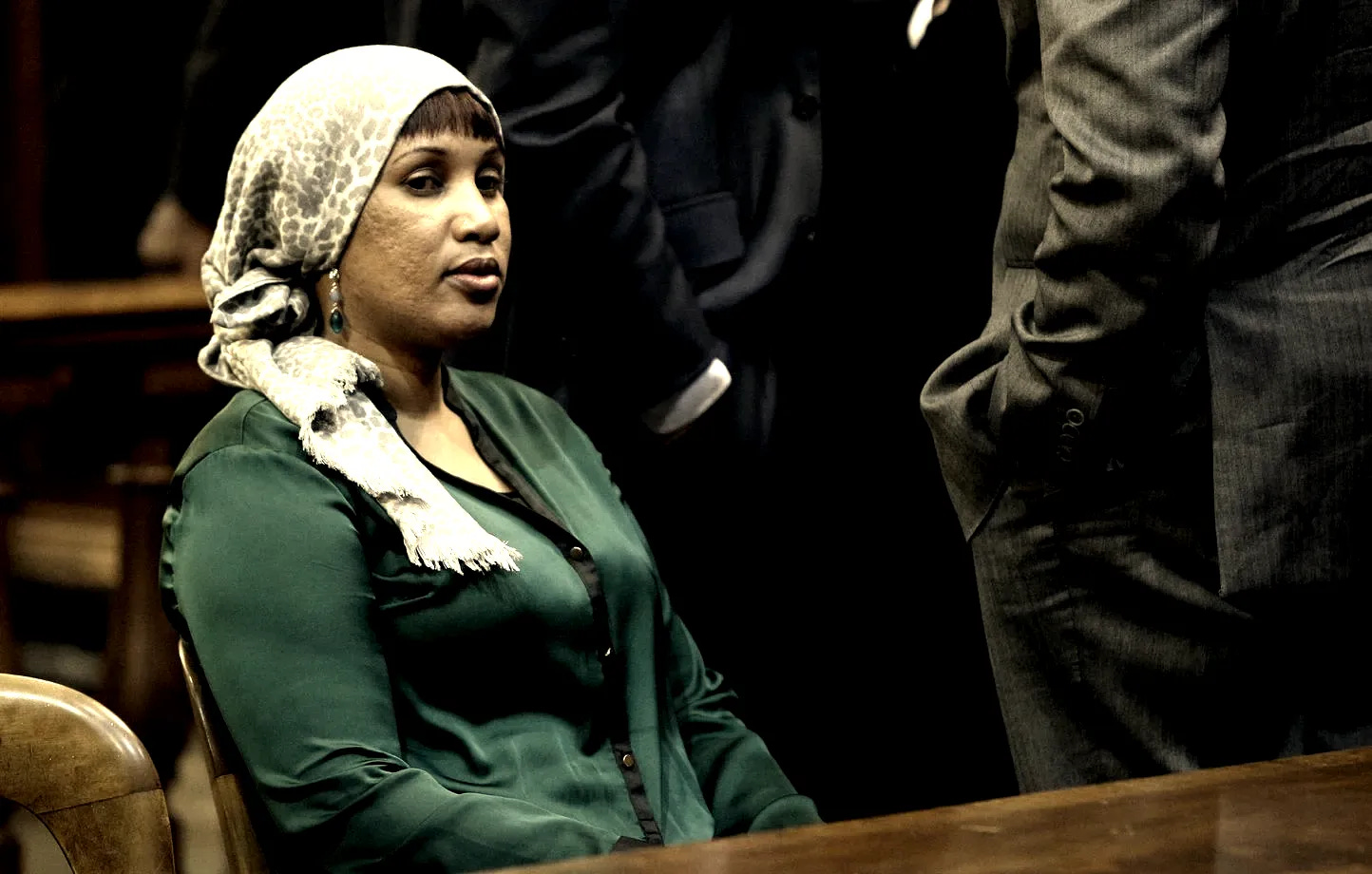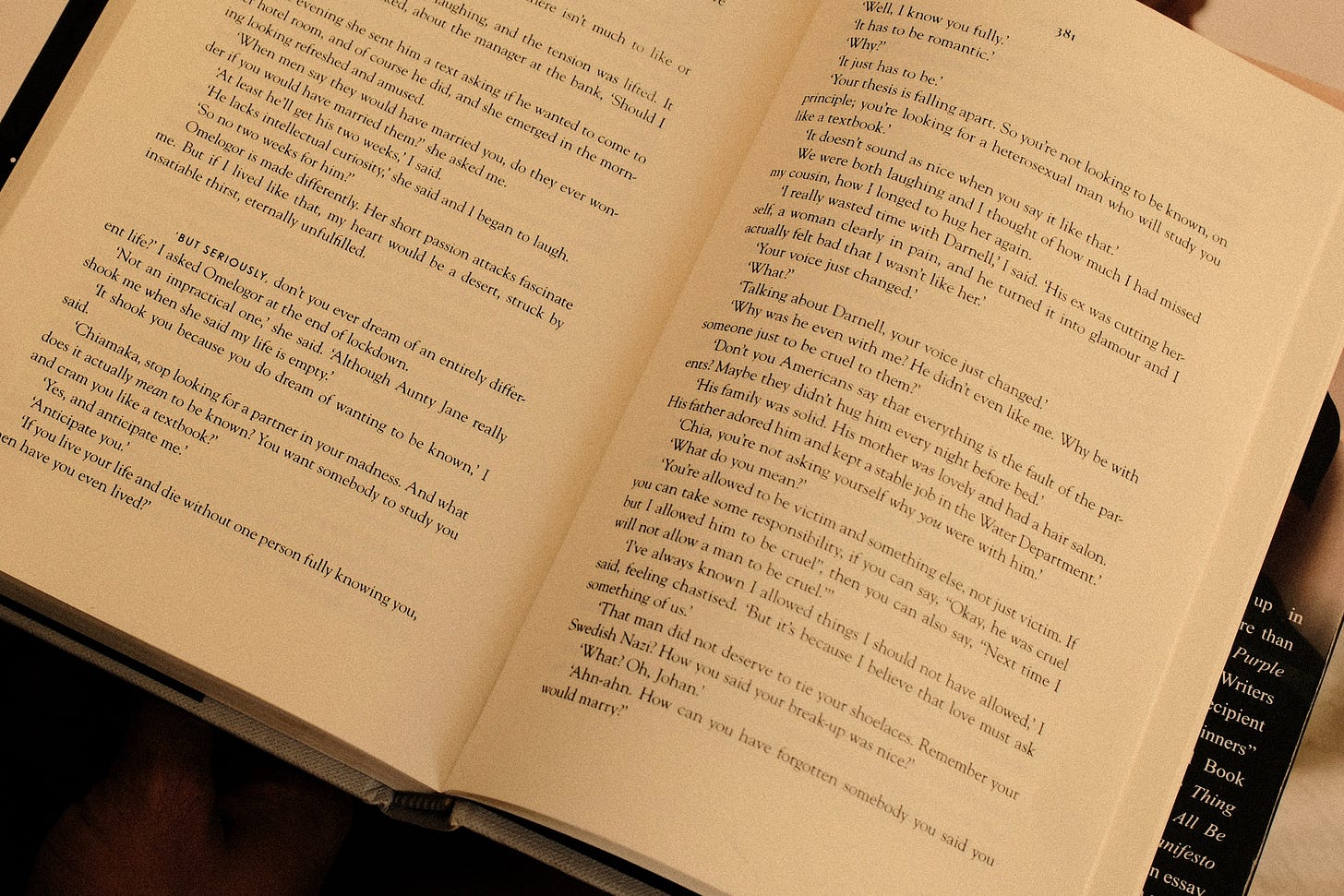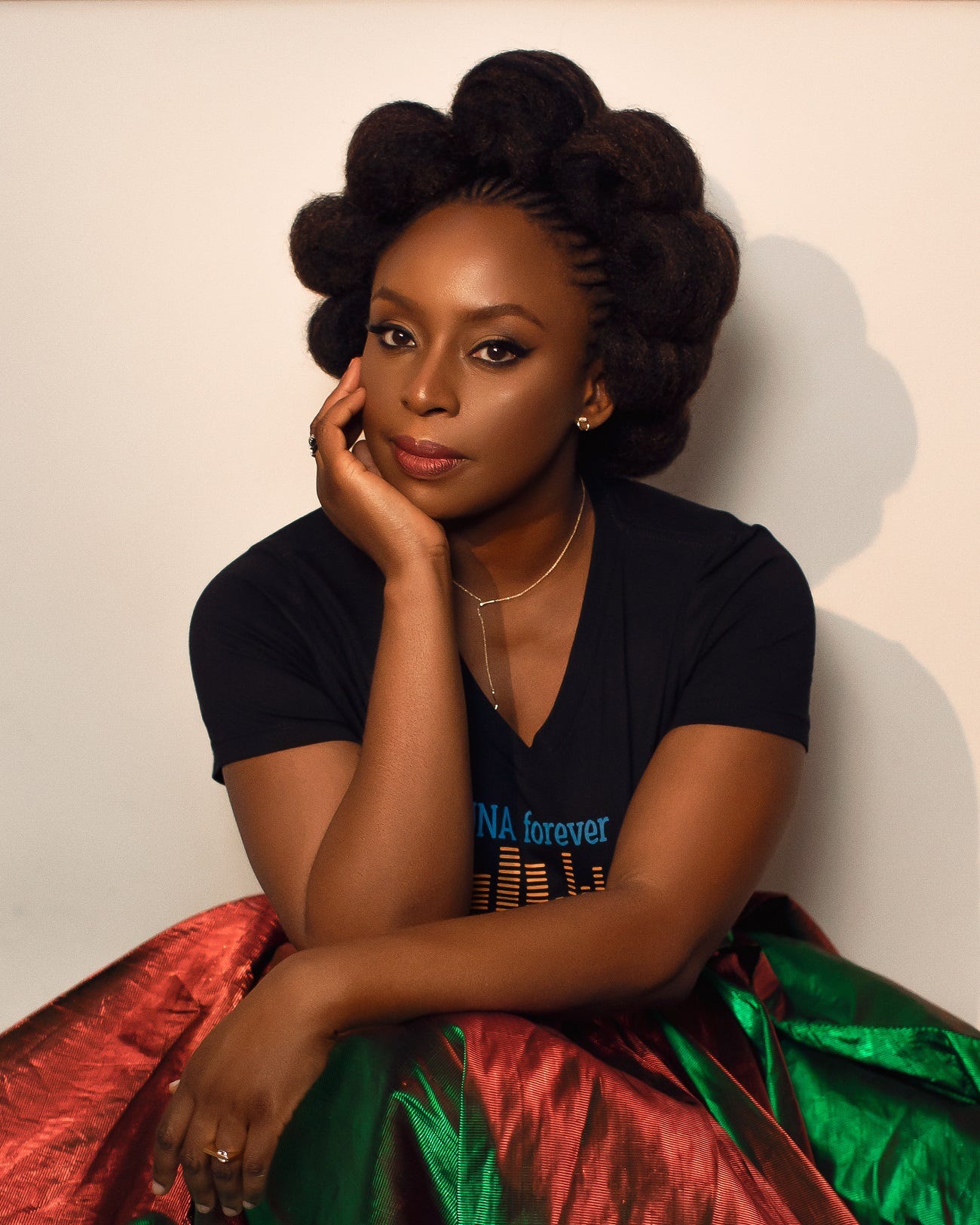What Exactly is a Dream Count?
A critical analysis of Chimamanda Adichie’s fourth and long-awaited novel.
Spoiler Alert: This is a detailed analysis, including a plot summary. If you haven’t read the book yet and plan to, leave this for now, but come back later. Feel free to share Connecting’s full review with someone who has finished Dream Count. They would appreciate it.
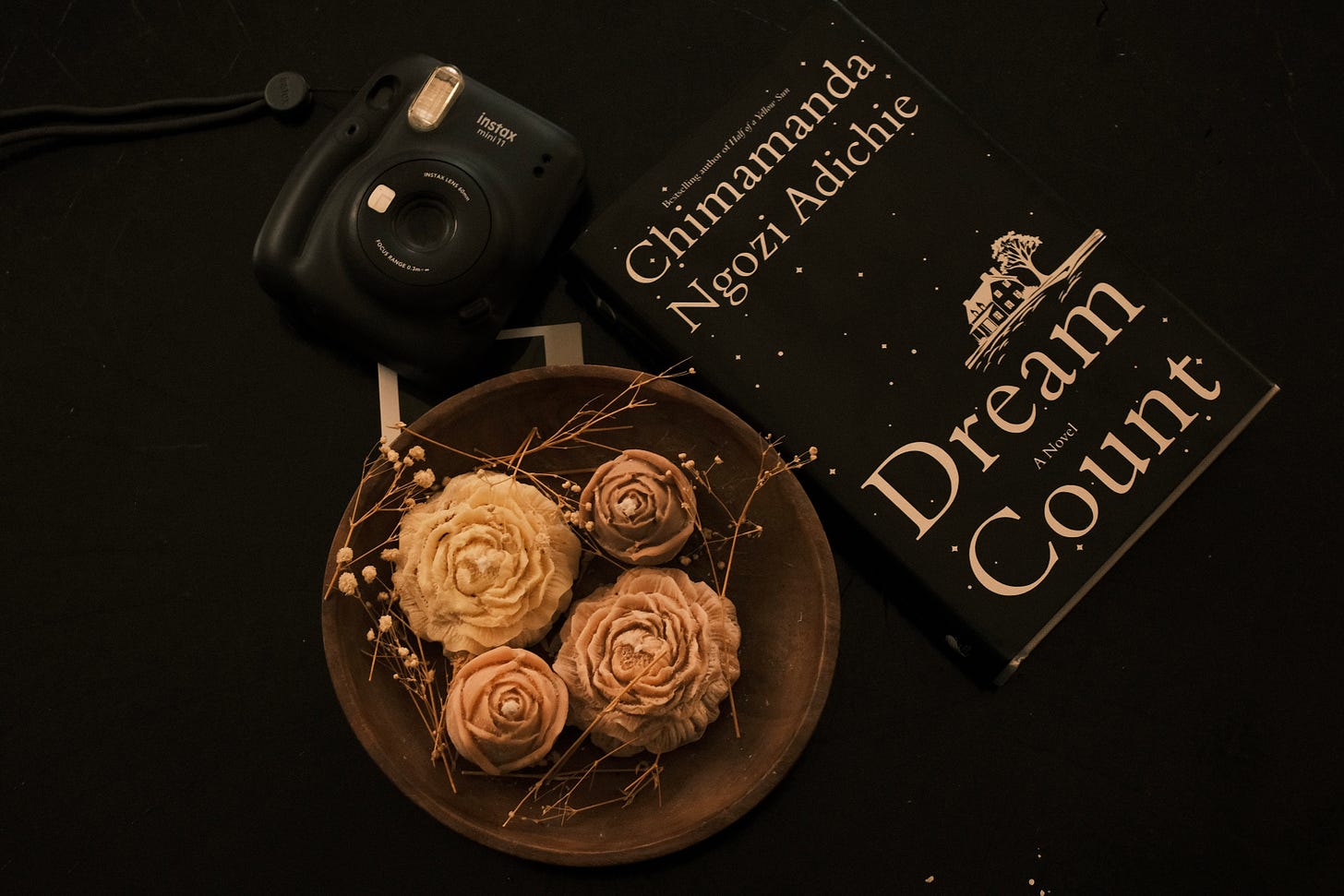
I first read Chimamanda when I was in SS2. The literature students were unusually excited about a book they’d been assigned to read. I was told that in this novel, the protagonist's father's buttocks jiggled like properly made akamu.
That day, classmates asked if I was ill.
I was quiet, glued to my seat, head bent over the wooden desk. I had been teleported to the pristine compound in Enugu, annoyed at Eugene and thrilled by the tension between Kambili and Father Amadi.
The second time I read Chimamanda, I was in my first year of University. It was the day before my exams. Even after a semester of skipping classes, I would not pick up textbooks. I was dodging Nigerian soldiers, getting excited over a pack of sugar, and searching for Kainene.
I could go on about Chimamanda Ngozi Adichie's ability to paint vivid imagery through the eyes of her protagonists or discuss the merits of writing that is so succinct it can communicate complex ideas to children. This essay could explore how, before her rise to prominence, many Nigerian girls and women saw feminism as a distant, almost frivolous concept. It was something meant for white, upper-class women rather than a movement that spoke to their own struggles.
So far, Chimamanda’s public persona has been hard to hate. She is able to invite dissenters into her world and bridge ideological gaps so effectively that Nigerian men now cite her feminism as the ideal. However, many, particularly on the radical left, see this palatability as a red flag rather than a virtue. Their dissatisfaction with her politics reaching its peak following her public and controversial stance on trans women.
But I’m not here to talk about Adichie herself. I want to dissect her book. I want us to decide if this novel is a good enough entrée to sate the hunger of fans who were left scraping by on essays and a short story collection for over a decade.
And while we are it, I want to know—what exactly is a Dream Count?
In this novel, we are thrust into the lives of four dissimilar women, beginning with Chiamaka.
“Chia,” a character who immediately appears inspired by the author’s life. She is a sweet, even naive Nigerian living in America caught in the chaos and uncertainty of the COVID-19 pandemic. Chiamaka is at the center of our story, the glue that holds the other protagonists together. She is best friends with Zikora, cousin to Omelogor, and employer of Kadiatou. She is a pampered, dreamy travel writer who is struck by a deep melancholy at the thought of growing old without being truly known. She turns to Google, searching for the men from her past and through them, her story is told.
Her first story is with Darnell. An African-American intellectual who people call the Denzel Washington of academia. Who makes Chiamaka feel inadequate and undeserving of love or even attention. Darnell dismisses her at every turn and, in conversations, exposes a tension between (wealthy) Africans and African Americans. He is convinced that Chia’s family wealth comes from the trans-Atlantic slave trade.
Darnell symbolizes the virtue-signalling leftist who cares in theory but never in practice. He espouses high-minded principles not in sympathy for the collective but because of how marginalization affects him, specifically. Darnell is the villainous victim, and so are his friends.
They “were the kind of people who believed they knew things. Their conversations were always greased with complaints; everything was “problematic,” even the things of which they approved.”
Nowhere is this hypocrisy more jarring than in Chia’s second home in Maryland. Darnell is greeted warmly by her Guinean housekeeper, but he barely acknowledges her. By his own ideals, he should see her, value her voice, and engage with her. Instead, he looks past her, his principles crumbling under the weight of his own biases.
After their relationship implodes, Chia searches again for intimacy. This time with an Igbo man who seems like the perfect find.
Chuka is everything Darnell was not. Rooted, respectful, and ready to settle down. “His manners were those of a person with good ‘home training’ he was interested in my family, my friends, the people who mattered.”
Yet here, Adichie probes a different frustration. The quiet discontent of choosing a partner not out of love but because they align with the values we claim to cherish, because they fit the mold of what society deems a “good match.” The comfort is undeniable, but so is the absence of passion.
And so, Chia strays. She falls for an unnamed, married Englishman. She finds a forbidden but passionate love. Their affair is sweet, intoxicating, and doomed. When this, too, unravels, the novel shifts, bringing us to Zikora’s story.
Her section begins in the throes of labor, sharing with readers the visceral agony of childbirth and the casual dismissal of suffering associated with the female sex. The woman is expected to power through it, especially by her mother, who refuses to hold her, even as an epidural is administered.
Zikora’s story is also told through the men from her past, particularly Kwame, the charming, loving, and ultimately absent father of her child. Chimamanda breathes life into a familiar yet perplexing archetype: the man who appears to be everything you’ve prayed for—compatible, affectionate, seemingly steadfast—until a demand for commitment exposes the hollowness of his love.
“She had always imagined her future in a vivid timeline—first a lucrative and prestigious job, then a splashy Catholic wedding, followed shortly by two children, or maybe three. ”
Zikora is a fiercely independent woman who is desperate for a man. Not because she needs his providence but because she wants to be whole. In her search, she invites two men she describes as “thieves of time” into her life as she considers herself bound to “biology's hysterical constraints.”
When she finally gets what she has longed for, a child, it feels nothing like a victory. Instead, it is a cruel twist of fate. Unmarried, abandoned, and thrust into the role of the pitied single mother, she is forced to reckon with a life she never wanted but now has no choice but to accept. And so does her even more conservative and emotionally distant mother.
Zikora’s relationship with her mother is one of painful adoration. Her mother, who had been up all night in the labor ward, “...didn’t look tired, this woman in her late sixties; her resilience, her excellence, began to feel like an affront to Zikora.” It becomes clear that much of Zikora’s ambition is not just for herself, but a desperate attempt to prove her worth to this woman who has made her insecure.
Like most children, Zikora is blinded by her need for her mother to recognize her humanity and fails to see that of her mother. Again and again, she unwittingly betrays the woman she seeks validation from, most notably in her passive acceptance of Aunty Nwanneka, her father’s second wife.
Zikora embodies the double standard that absolves fathers while holding mothers to impossible expectations. She does not resent her father, even when she knows his decision to take another wife stems from her failure to be born a son. Even when he abandons his promise to stay and moves in with Aunty Nwanneka, she directs no anger at him.
With all the strain between them, Zikora’s mother is the one beside her during birth. Not the father of her child or her own father.
Zikora learns how her birth cost her father's loyalty because “To be a wife without a womb was to be useless.”
When we enter Kadiatou’s point of view, we are forced to listen to a voice that, like Darnell, we often ignore. Kadiatou’s story made me contend with the privilege of being Nigerian. Made me aware that despite the many disadvantages of this Nationality, we enjoy representation and dominate African culture through literature, music, and film. I tried to think of books, songs or movies I’d consumed from other African countries and could only list a handful.
At the end of the novel, Chimamanda notes that Kadiatou is based on a woman of similar origin. While this character strays from the author’s comfort zone by not being Igbo, she still explores her usual theme of the disillusionment that comes with migration. As the novel moves through personal and political awakenings, Kadiatou’s story is its only tether to suspense.
Kadi’s character is a well-developed and rarely represented iteration of the Black African female. She is Muslim, Pular(Fula)- speaking and poor. Unlike the grand ambitions often imposed on characters like hers, Kadiatou does not aspire to much. And yet, in stark contrast to what one might expect for a girl born into her circumstances, she is surrounded by powerful women.
Her first and only love is Amadou. “She wanted to be Amadou’s wife, she wanted nothing more.” Amadou is an optimistic, determined, and faithful lover who, through nooks and crooks, achieves his dream of going to America. He is one of the novel’s better romantic figures, but as we come to learn, goodness alone is no shield against systemic injustice.
Kadiatou becomes independent after losing a husband she was compelled to marry. But even then, her life remains tethered to men, her survival dictated by work relationships with them. It is during this phase that she is raped. This experience laying bare the cruel paradox of a man desiring a woman while despising her. Once again, her agency is stolen. Once again, she is reduced to something taken rather than someone choosing to give.
"She had done nothing wrong, it was she who had been harmed, and yet she felt shame as an acute rupture of her internal order.”
Almost every woman knows this shame intimately. It is why so many never come forward. Because survival itself invites judgment. Because when a woman’s worth is measured by “sexual purity,” surviving rape is not just enduring trauma; it is accruing shame.
“Nobody would ever know. She would tell Tantie Fanta and Mama that François fired her because she asked to be a cook and not a waitress.”
Kadi finally grasps a fragile semblance of stable joy. Her resilience, hard work, and quiet brilliance propel her as far as the constraints of her origins allow. But joy, for someone like Kadi, is always fleeting. The weight of her intersecting disadvantage inevitably crushes both her and her love.
Through this fictionalized real-life story, we witness how the world and "the land of the free, home of the brave" treats those it was never meant to include.
And now, Omelogor. The most man of them all. The character I identify with the most, not just for her sharp opinions and matter-of-factness, but for her refusal to contort herself to fit harmful conventions. I also loved that her story unfolds in Abuja rather than Lagos, a refreshing departure from the usual, and a testament to Chimamanda’s skillful inclusion of overlooked perspectives.
Like the other women, she is constantly bombarded by external pressure to find a man and birth a child. But unlike them, there is no internal pressure to do so. Until Aunty Jane says, “[Adopting a child] is the only option left to make sure your life does not remain so empty. Just because a husband did not come for you, it doesn’t mean you must live an empty life.”
But Omelogor’s life is far from empty. She is fulfilled by her work, her friendships, and, in a refreshing shift, the love stories of people often left out of mainstream narratives. Her closest friends, Jide and Hauwa, are both queer. Jide’s sexuality is acknowledged and then allowed to be, rather than becoming the defining feature of his existence. An approach I found pleasing.
Unlike the other protagonists, Omelogor’s most romantic connection is with a woman. Meanwhile, the heterosexual men in her life are either professional acquaintances or fleeting “short passion attacks.” Yet, despite her strongly gynocentric views, she sees value in a feminist approach to “catering” to men. Her successful blog drips with both diplomacy and sarcasm as she advises her male audience on how to be better.
Omelogor is stern and loving in a practical way. Her certainty unsettles almost everyone she meets, including Zikora, who envies what she perceives as Omelogor’s unearned charm and success. But beneath her self-assurance lies struggle, particularly during her formal study of pornography in the U.S., where she collides head-on with American biases.
She quickly learns that the American mind, especially its so-called “perfect, righteous liberals”, has little room for realities that exist outside its own rigid frameworks. Instead of adding nuance to their views on Islamophobia, classmates dismiss her account of Uncle Hezekiah’s murder by Muslims in Kano, unwilling to reconcile it with their politics.
Omelogor’s time in America is a reminder that even the strongest women are not superhuman. That resilience, no matter how deeply ingrained, has its limits.
"America didn’t owe me restoration and yet I felt that it did, as if it had reneged on a promise that was never really made.”
I read Dream Count in four days. The first day, I wondered what the book was about and what Chimamanda meant by the title. By the second, I felt a lull, wishing the stories would meander less and move with clearer intent. I couldn’t pinpoint an overarching plot, just a well-woven collection of romantic entanglements that made me wonder: can women have no exploration without centering men?
But that is the point of Dream Count. Or just one of them. The novel has so many points that it’s almost astonishing it fits into 400 pages. As I read, I imagined Chimamanda at her desk, listing all the arguments she wanted to weave into these stories. Yet, for all its deliberateness, nothing feels forced. This subtlety sets the novel apart from most mainstream media with left-leaning messages. Dream Count isn’t pushing an agenda. It is real life.
Every character, even those with just a few lines, carries a depth that makes them believable. The fleshing out of Kadiatou is worthy of praise because she does not feel like a caricature, only existing to prove a point. Too often, even well-meaning storytellers create characters that are flattened images of the lives they are meant to represent. The conversation on who can write whose story is important, especially as mainstream media projects the perceptions of white, often male, writers, editors, publishers and producers onto minorities. While the average American might not know the difference between urban Nigeria and rural Guinea, most of Chimamanda’s readers should appreciate this novel exploration.
Besides its realistic characters, Dream Count brims with subtle, lifelike microplots. However, this could be a drawback for readers who prefer a more straightforward narrative; some might dismiss it as aimless. The novel’s non-linear structure occasionally meanders, and while this style is executed masterfully, it may test readers’ patience before they become fully immersed in its web of contentious themes. Yet, the author deftly masticates these weighty subjects into a narration so digestible that even those who dislike their taste will find themselves swallowing.
Despite its scope and absence of gripping suspense, the novel delivers a resolution that is both nuanced and thematically consistent. While the privileged Chia serves as our entry point into these women’s lives, it is Kadi who brings their journeys to a close. In the end, Dream Count reinforces the idea that a 'good' outcome can take many forms. Even when it is not the one hoped for."
It is in the final pages, in a conversation between Chiamaka and Omelogor, that I finally understand what the title means.
Dream Count is a reimagining of “body count”—a phrase often wielded to reduce women’s intimate histories to a measure of their worth. Within the patriarchy, sex is framed as a man’s conquest and a woman’s loss, her value diminishing with each encounter. But this same ideology diminishes men, stripping them of depth and reducing their roles in women’s lives to mere transactions. Chimamanda uses her unusually powerful African female voice to send a message that affirms her value in our divided and oppressive society.
Chiamaka shares her Body Count. But no one is tallying the men she has slept with. No one brands her a slut. She is simply a woman looking to be truly known. And in her stories, through the thrill, heartbreak, wonder, and disappointment, we come to know her. She is not a sum of her lovers. She is a person in pursuit of something real.





